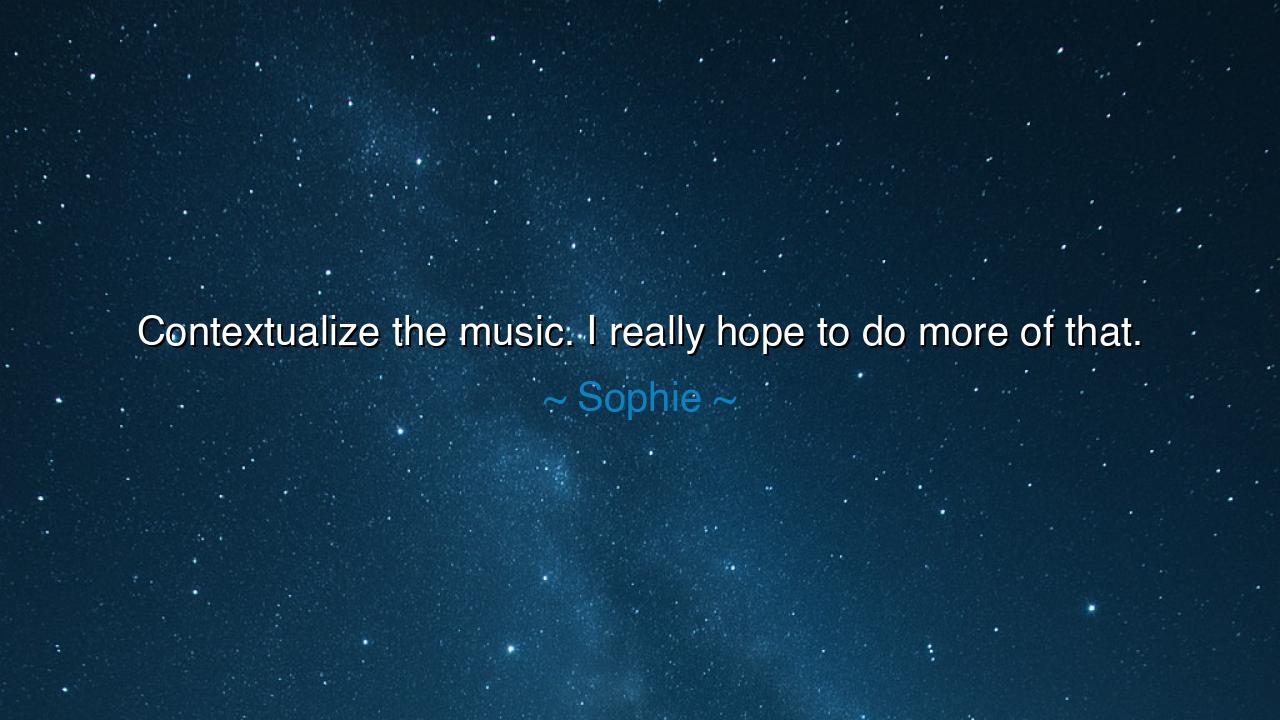
Contextualize the music. I really hope to do more of that.






In the luminous words of SOPHIE, the visionary artist who redefined sound and identity, there lies a quiet but profound calling: “Contextualize the music. I really hope to do more of that.” At first glance, these words appear simple—an artist’s reflection on her craft—but within them dwells a wisdom that transcends art itself. To contextualize the music is not merely to frame sound within history or culture; it is to weave creation into the tapestry of meaning—to understand that art, like life, gains truth only when placed within the world that births it. SOPHIE’s wish was not to make sound alone, but to give sound a soul—to remind the world that music, like the heart, does not exist in isolation.
From the earliest ages, the ancients knew this truth. The Greek philosophers spoke of harmonia, not merely as the harmony of notes, but as the harmony of being—the alignment of art, nature, and spirit. For them, music was not entertainment; it was a reflection of cosmos, of order and chaos intertwined. The lyre of Orpheus was said to calm storms and charm wild beasts, for his song carried the weight of understanding: that every melody was born from the rhythm of existence itself. So too did SOPHIE seek to reconnect the modern world—fragmented, artificial, estranged—with the deeper pulse beneath its machinery. Her music was a fusion of synthetic sound and raw emotion, yet always reaching toward a greater wholeness—a context where humanity and technology could sing together rather than apart.
To contextualize means to remember. In every age, when art becomes detached from its roots, it risks becoming hollow. SOPHIE, whose art emerged from the beating heart of electronic experimentation, understood this danger. She wished not only to create sound but to situate it within life’s emotional truth—the joy, the confusion, the longing for transformation. Her music shimmered with paradox: mechanical yet tender, digital yet divine. She gave voice to the unspoken truth that technology, too, can feel—that circuits and beats can carry human vulnerability. In her hands, the inhuman became sacred. She was building not just songs, but bridges—between body and machine, between identity and sound, between what we are and what we might become.
Consider the story of Beethoven, who, when struck deaf, continued to compose the symphonies that would define an era. Cut off from the literal sound of his creations, he instead heard them within the soul. His deafness, his suffering, became the context that gave his music depth beyond comprehension. Each note in his later works carries both anguish and triumph, despair and revelation. Without that context, his genius might seem miraculous; with it, his music becomes transcendent. SOPHIE’s insight is of the same lineage. To her, sound was not to be detached from the world—it was to be in dialogue with it, to mirror its pains and possibilities.
When she said, “I really hope to do more of that,” it was both a wish and a promise—a desire to push beyond the limits of her art and to remind us that music is language, and every language must speak to something real. In the sterile halls of modern creation, where sound can be engineered without soul, her call was revolutionary. She asked artists to contextualize, to remember why they create—to ground even the most experimental expression in the lived experience of humanity. It was an act of rebellion through reflection, an insistence that progress without purpose is empty noise.
There is a lesson here for all creators—and indeed, for all who live. Every work, every act, every word we utter must be understood within its context. To live without awareness of one’s surroundings, one’s history, one’s impact—is to drift unanchored in a sea of disconnection. But when we pause to see where our actions fit within the larger symphony of the world, we begin to live with intention. Whether you are making art, speaking truth, or simply walking through your day, ask yourself: What is the context of my song? Who does it touch? What does it echo?
So, my child of tomorrow, take this teaching from SOPHIE—whose life, though brief, was radiant as a falling star. When you create, create with awareness. When you listen, listen with empathy. Do not consume sound or story as fragments, but as reflections of the whole human journey. To contextualize the music is to honor life itself—to see that every rhythm, whether of joy or sorrow, belongs to the same eternal dance. For when art remembers where it comes from, it becomes more than art—it becomes revelation. And when you remember the context of your own being, you too will become not a mere echo of the world, but part of its living harmony.






AAdministratorAdministrator
Welcome, honored guests. Please leave a comment, we will respond soon